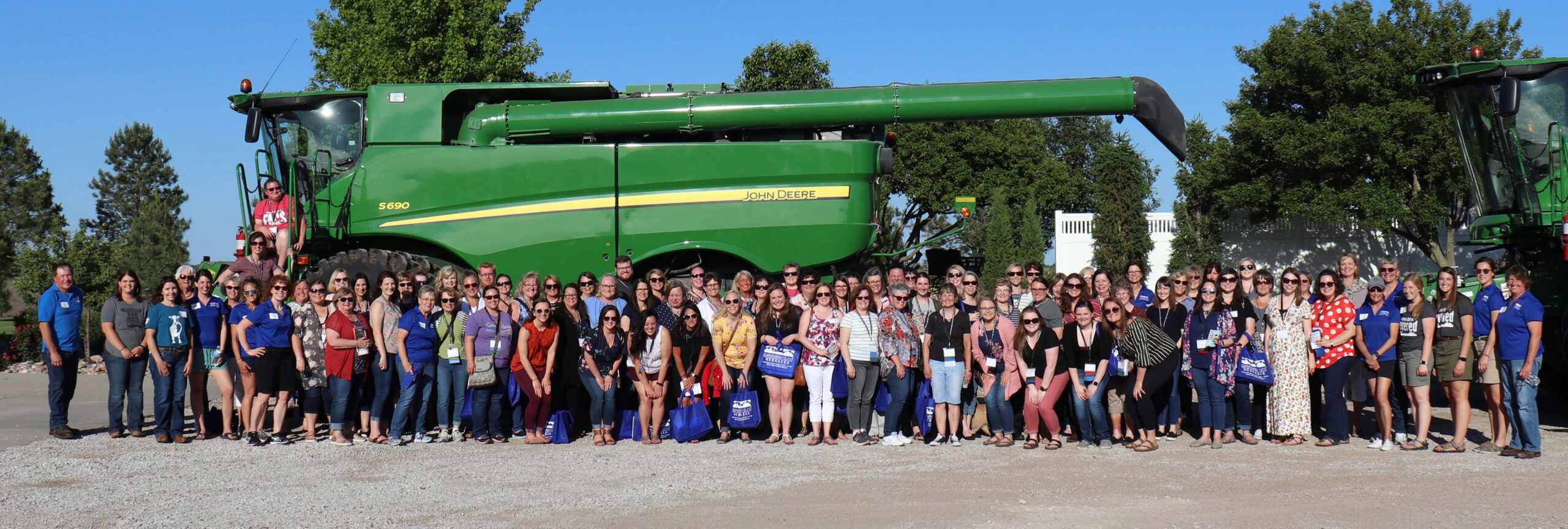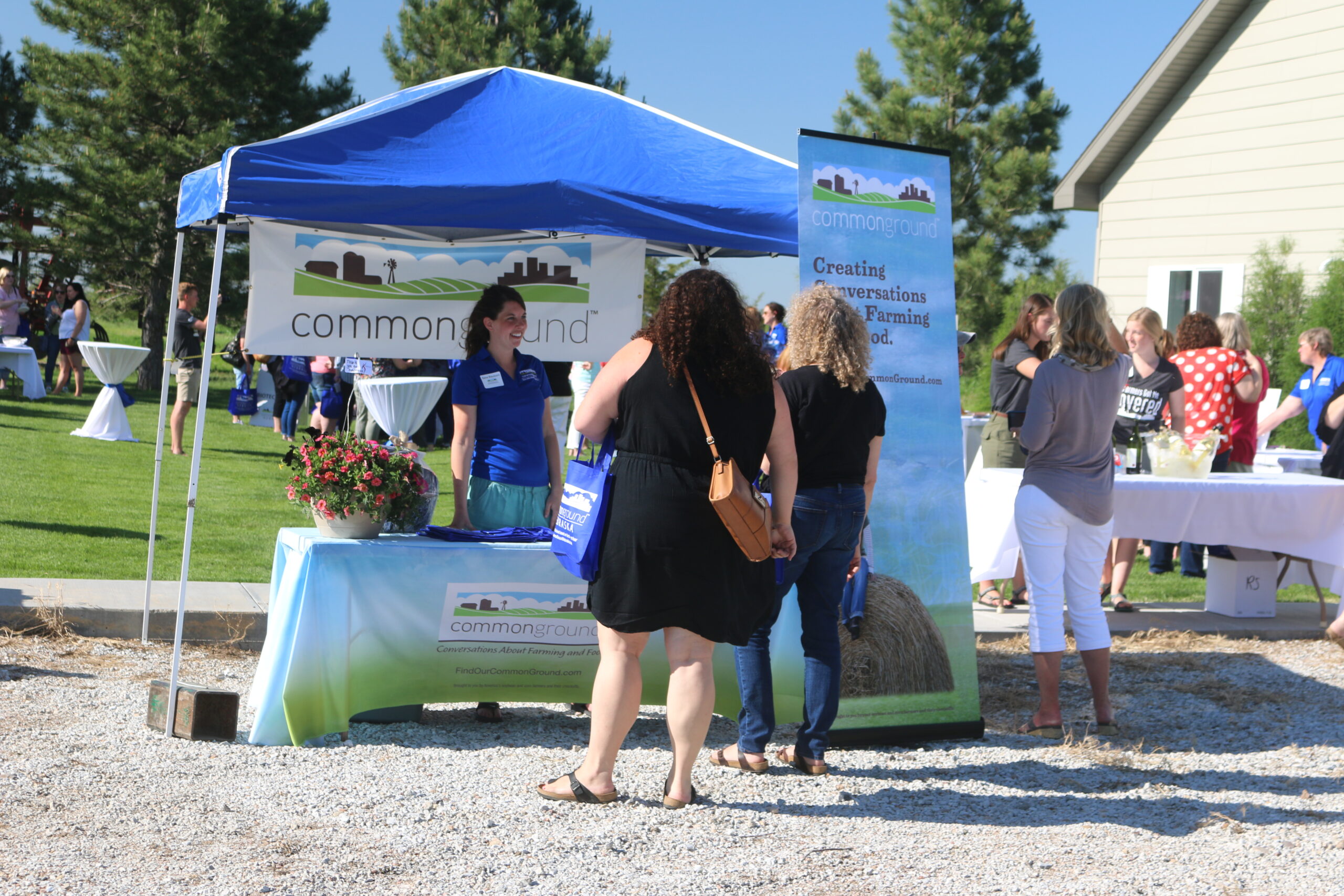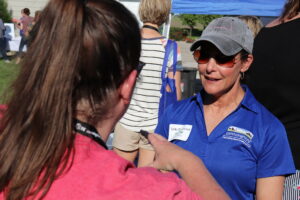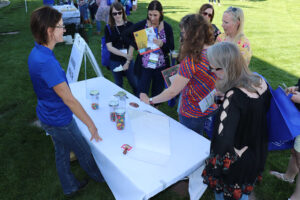Nebraska CommonGround volunteers invited Nebraska Family and Consumer Sciences (FCS) teachers to Shelton for their second Banquet on the Farm event. This hands-on learning experience allowed teachers to engage in conversations about the safety of modern agriculture. CommonGround volunteers are made up of volunteer farm women across the state who are passionate about helping consumers understand how food is grown and raised.

The event kicked off with learning opportunities revolving around different educational stations. The topics of these learning stations included animal health, genetically modified organisms (GMOs), production methods and sustainability. FCS teachers were able to hear from CommonGround volunteers who have extensive experience with these topics. As part of the educational stations, dairy cattle, chickens and pigs were also on display. Following the educational social hour, a buffet dinner was served featuring locally sourced foods.

“By reaching out to these FCS teachers, we’re able to provide them with the tools they might need to help educate the next generation of smart consumers,” said Deb Gangwish, CommonGround volunteer and farmer from Shelton. “We know not as many youth are growing up on farms or even in farming communities. Therefore, we want to bring agriculture to the students. What better way to do this than through their teachers?”

Throughout the event, the 76 teachers in attendance were able to visit with CommonGround volunteers about agriculture. By being on a farm, teachers were able to better understand modern farm practices, and they were able to ask questions to clear up misinformation.
“One misconception that stuck out to me revolved around the bad reputation GMOs receive, something many of my students are curious about as well,” said Louise Dornbusch, Papillion-LaVista FCS educator. “I learned that there are only 10 GMO products out there, and each one is modified for the benefit of the crop and consumer—not to harm them.”
While this was the first time CommonGround and Nebraska FCS teachers came together, the volunteers hope it’s not the last time. While visiting with the teachers, CommonGround volunteers let them know of their availability beyond this event.
“We know it’s difficult for teachers to stay up-to-date on everything, so we want to be a resource for them if they’re ever talking about food or food production in their classes, or just teaching about being a smart consumer,” said Joan Ruskamp, CommonGround volunteer and cattle producer from Dodge. “Our dynamic group of volunteers represent almost all aspects of Nebraska agriculture, and we’d love to be a resource for these classrooms.”

Teachers who attended the event are already excited to bring back what they learned to their classrooms.
“I think it was the best learning experience and social we have ever had in the 15 years of my teaching, said Dornbusch. “It was just a fantastic, beautiful, welcoming place and it was so neat to learn about these operations from CommonGround women. I’m truly excited to bring all this back to my students who really are hungry to learn more about how our farms and ranches operate.”
CommonGround is a national effort designed to help consumers base their food purchasing decisions on fact rather than fear. Nebraska was one of five states to pilot this program in 2010. CommonGround Nebraska is funded by the state’s corn and soybean farmers. For more information, visit commongroundnebraska.com. Additional photos from the event can be found by clicking here.
The Nebraska Corn Board is a state funded agency funded through a ½-cent-per-bushel checkoff on all corn marketed in the state. The mission of the Nebraska Corn Board is to promote the value of corn by creating opportunities. Checkoff funds are invested in programs of market development, research, promotion and education.
About the Nebraska Soybean Board: The nine-member Nebraska Soybean Board collects and disburses the Nebraska share of funds generated by the one half of one percent times the net sales price per bushel of soybeans sold. Nebraska soybean checkoff funds are invested in research, education, domestic and foreign markets, including new uses for soybeans and soybean products.
